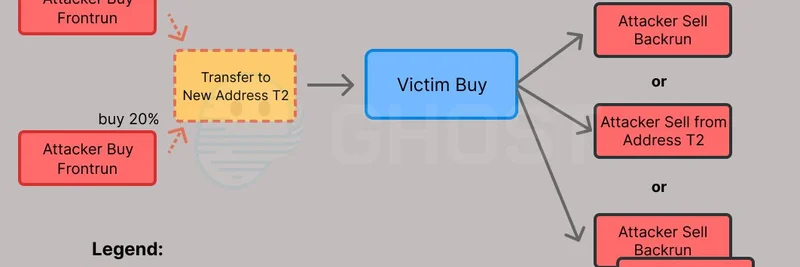If you've been diving into the wild world of meme tokens on Solana, you know that trading can feel like a battlefield. One of the sneakiest threats out there is the sandwich attack—a type of MEV (Maximal Extractable Value) where bots squeeze your trade between their own buys and sells to skim profits off your slippage. It's especially brutal for volatile meme coins where every second counts.
Recently, Chris from Ghost Logs dropped a major update on their tool, Sandwiched.me, rolling out Sandwich Detector v2. This isn't just a tweak; it's a game-changer in spotting those crafty bots that have gotten smarter at hiding their tracks.
The Evolution of Sandwich Attacks
In the early days, a classic sandwich was straightforward: a frontrun transaction buys the token just before your swap, pumping the price, then a backrun sells right after, leaving you with less than you bargained for. But attackers have leveled up. Now, they might split frontruns and backruns across multiple transactions or even hop tokens between wallets to dodge detection.
Chris explains it like this: "Sandwich bots are crafty and detection is a constant cat-and-mouse game." Their new detector crunches data from over 50 AMMs (Automated Market Makers), analyzing swaps, transfers, and other signals to flag even the most obfuscated attacks.
Community Pushback and Validator Accountability
The thread gives a shoutout to community members like @Shiroi_sol, who's been calling out validators running these attacks while staked through pools like Marinade Finance. Shockingly, over 20% of Marinade's stake was tied to sandwiching validators in a recent epoch. That's a huge chunk of SOL powering malicious activity, which hurts everyday traders in the meme token space.
Ghost Logs is urging folks to delegate to clean validators and even offers their own for those looking to support ethical infrastructure. Pools like JPool and AeroPool are already on board, delegating to help secure the network without the toxicity.
Anatoly Yakovenko's Smart Proposal
Enter Solana co-founder Anatoly Yakovenko (@aeyakovenko), who chimed in with a clever idea: "What do you think of lagging the data by two weeks to get @TimGarcia0 @MarinadeFinance and stake pools to kick out attackers without the attackers seeing the feedback that they are detected right away?"
This is brilliant for meme token enthusiasts because it flips the script on the cat-and-mouse dynamic. By delaying public detection data, stake pools can quietly revoke bonds or unstake from bad actors. Attackers won't get immediate feedback to adapt their strategies, giving the good guys a stealth advantage. It's like setting a trap that springs before the bots even know they're caught.
Replies in the thread, like from Brian at Jito, note that it might not stop everything—some validators could still rug commissions—but it's a step toward reducing toxic MEV without alerting the culprits.
Why This Matters for Meme Tokens
Meme tokens thrive on Solana's speed and low fees, but sandwich attacks erode trust and profits for retail players. Tools like Sandwich Detector v2 empower you to check validators' "sandwich rates" and choose where to stake. If you're launching or trading memes via platforms like Pump.fun, staying informed on these updates can save you from getting sandwiched.
Head over to Sandwiched.me to toggle between v1 and v2 detectors and see the difference yourself. And if you're staking, consider supporting projects like Ghost that are fighting for a fairer ecosystem.
As Solana continues to evolve, proposals like Yakovenko's could make the network even more robust against MEV exploits, benefiting the entire meme token community. What's your take—would data lagging work, or do we need more radical fixes?




